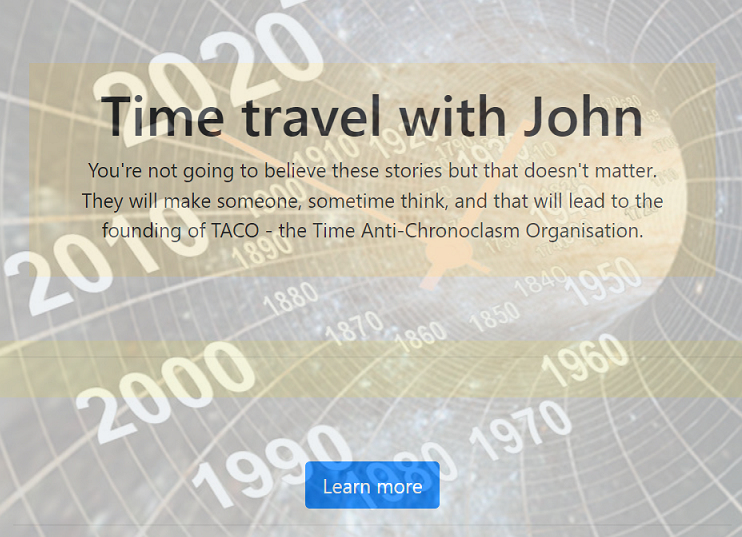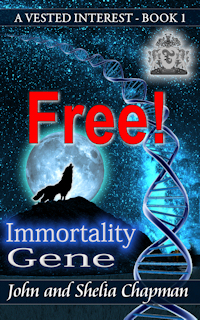Effective methods of book promotion
What doesn't Work
- Some book promotion sites
- Buy my book adverts on Amazon, Google, Facebook, Twitter
What Works
- Adverts featuring humour
- Some book promotion sites
- Adverts on Amazon
- Adverts on Google
- Facebook adverts
Huh! What works is often also what doesn't work. How is that? Let's deal with each seperately.
Adverts Featuring Humour
I'll deal with this on a separate page of examples
Amazon Adverts
Think about your book cover. An Amazon advert will display it like this:

This is what Amazon thinks I may buy from the selection of adverts they have been paid to display.
They'll also show:



and other categories such as 'Top rated', 'Best sellers', 'Most wished for', 'Most gifted' and 'Recommended for you'.
Notice how little information you are given? If a book attracts attention the user will be expected to click on it to find out more. This makes an interesting cover vital!
Let's assume that the cover image for 'Shuggie Bain' catches your attention and it's clicked on. You'll then see:

Immediatly you'll see it's a Booker prizewinner, has sold a million copies and it's just £1.99 for the Kindle edition. It has review information and two lines of author 'Description' which leaves you with the desire to 'Read more'. Would this extra information make you click the link or even buy it? If you do, you'll find the rest of the description is:
It is 1981. Glasgow is dying and good families must grift to survive. Agnes Bain has always expected more from life, dreaming of greater things. But Agnes is abandoned by her philandering husband, and as she descends deeper into drink, her children try their best to save her, yet one by one they must abandon her to save themselves.
It is her son Shuggie who holds out hope the longest. Shuggie is different, he is clearly no’ right. But Shuggie believes that if he tries his hardest, he can be normal like the other boys and help his mother escape this hopeless place.
Shuggie Bain lays bare the ruthlessness of poverty, the limits of love, and the hollowness of pride. For readers of A Little Life and Angela's Ashes, it is a heartbreaking novel by a brilliant writer with a powerful and important story to tell.
Personally, I think the first part of the last paragraph should have been the first paragraph making that read:
Shuggie Bain lays bare the ruthlessness of poverty, the limits of love, and the hollowness of pride.
It is 1981. Glasgow is dying and good families...
Why? Because this would be visible immediately and let prospective readers know that this is a book portraying the catestrophic effect of poverty on some families.
Think carefully about the book description visible immediately after the cover image catches attention. It must have a powerful effect if the book is to sell.
Did the publisher's choice of keywords help?
In this case - not in the slightest! The publisher, Picador, seems to have made little use of them. I checked with KDP Rocket and calibre to see what keywords were used. KDP Rocket shows keywords that might actually find the book at Amazon. The calibre keyword method finds the tags actually used in the epub source file submitted. Here they are:
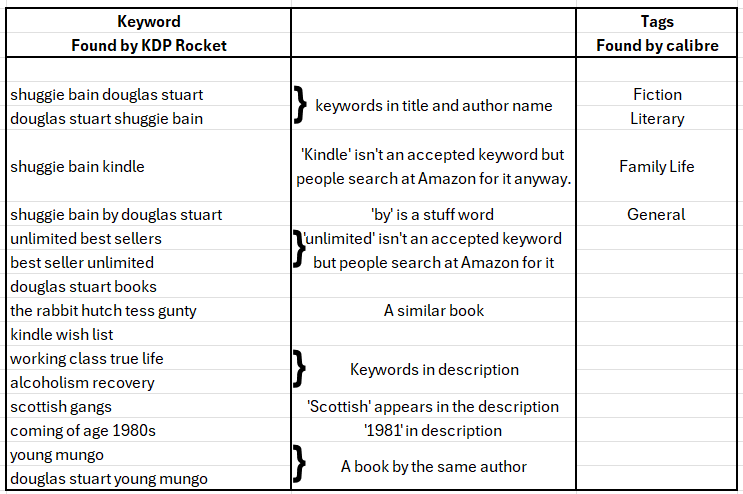
Seems to me that the publisher has relied on reviews and its Booker Prize success to promote the book.
If you find this guide useful...
Can you help me out?
If you find these pages useful you can return the favour by downloading a FREE ebook from Amazon - even if you don't read it, it will help our rankings! I think you'll probably like it though.
It's the first book of a series of 9 books (so far) which tell the story of how life on Earth was saved from a cataclysmic extinction when a rogue planetoid collides with Earth in 7141. This first book deals with how humanity was made immortal, giving us the incentive to do something about an event so far in the future.
Take a touch of humour, add some genetic science and nanotechnology. Steep with conspiracy and stir in murder and despair. Season with romance between three people in a secret location. Garnish with morality.
The result is 'Immortality Gene', the first in a novel series by John and Shelia Chapman. The ebook of book 1 is FREE and available at multiple retailers
Google Adverts
What can a prospective reader find using a Google Search?
If they know the book title, for example 'Shuggie Bain' then typing in a few letters of it can often find results. Even if someone spells the title wrongly and types 'suggie' Google, because it's an intelligent search engine (unlike Amazon) will still find it.
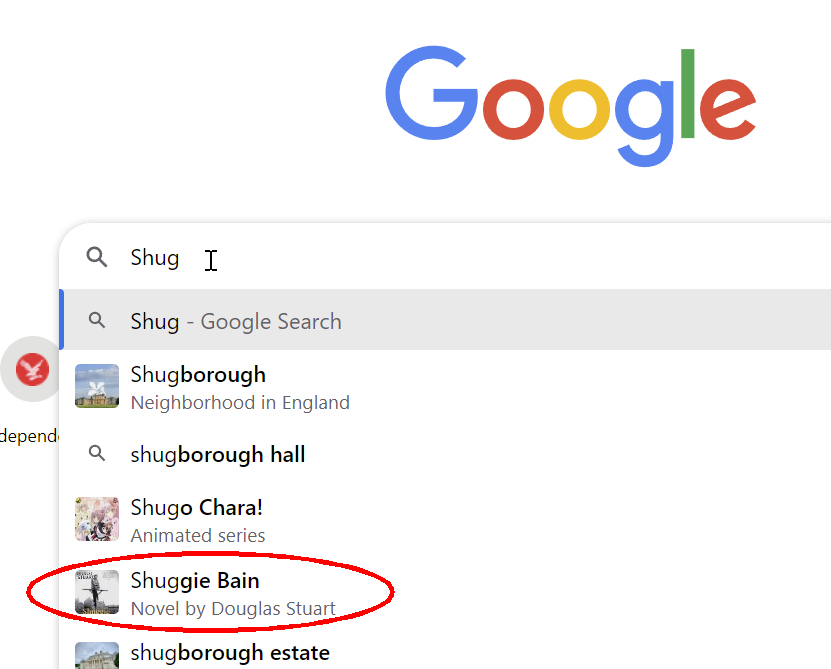
But what if the title and author of the book are not known? Doing a Google search for "books UK poverty fiction" finds this:
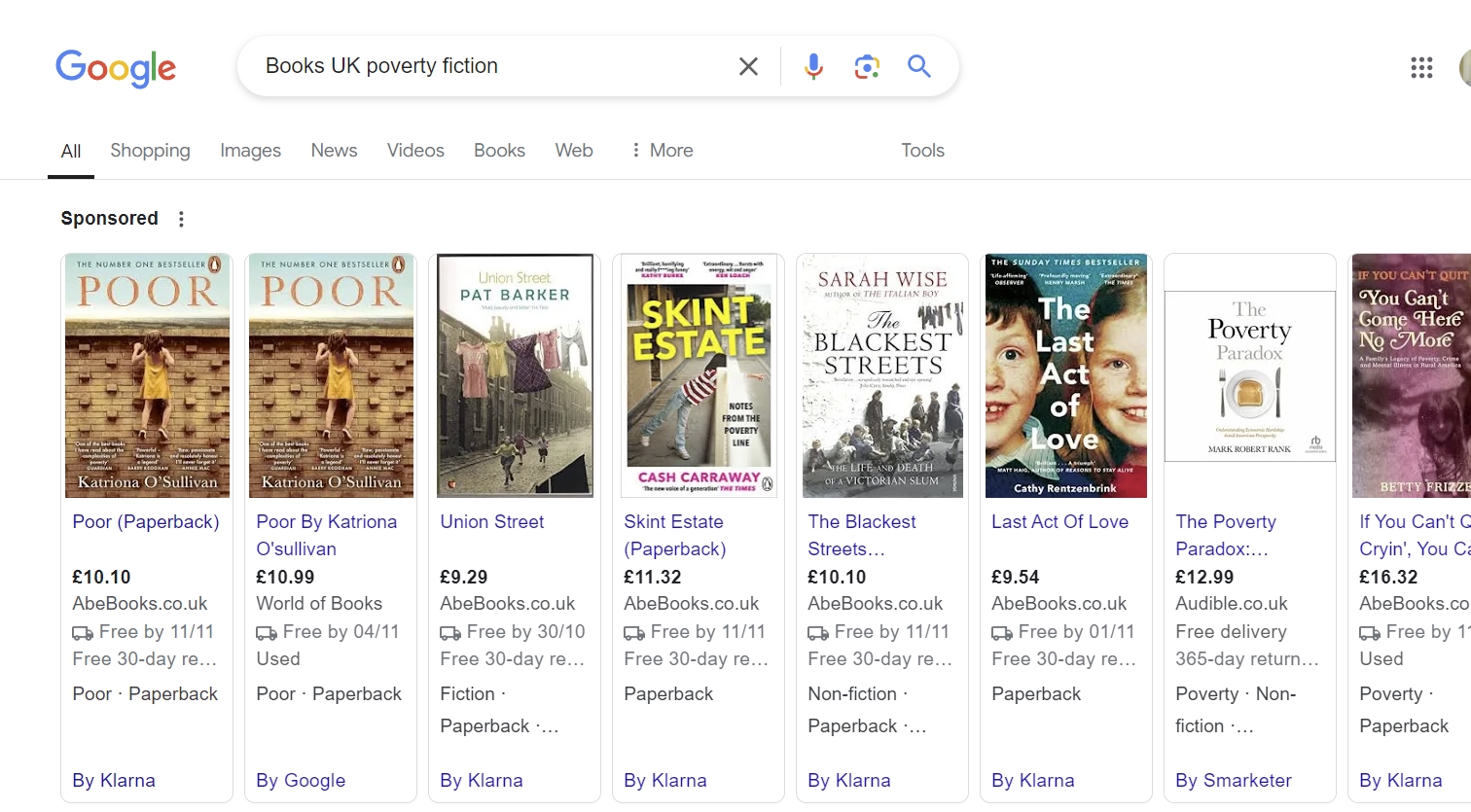
Scrolling the sponsored listings sideways finds Shuggie Bain as the 13th entry. To be sure of success an author needs his/her book to appear without scrolling sideways. Examining the keywords of 'Poor' finds an impressive list of keywords used.
As you can see, Google shows very little of the book in sponsored search results. Again you must select from the thumbnail images to find more detail. Which would you choose?
Book promotion sites
There are thousands of these but not all of them are effective. Those which are effective tend to cost more to promote there. The clear leader is Bookbub but it's very expensive to promote there. Because it's so successful, there's a high demand for promotion slots and not all requests for promotion there will be approved.
When looking for promotion sites my first port of call is to go to Dave Chesson's Kindlepreneur website and use his list of promotion sites. You'll need to subscribe to the Kindlepreneur website to see his favourites - well worth doing..
Facebook Adverts
If you go on Facebook and place a link to your book cover and it's image don't expect to get many sales. 'Buy my book' adverts simply don't work. You need to craft an advert which catches the eye with an image and makes the reader click to find out more.
Spend some time learning about Facebook advertising. Your first source shoulf be the advertising management pages at Facebook - https://www.facebook.com/business/m/ads-manager
Facebook will ask you to set a campaign objective and offer a choice of:
Awareness,
Traffic,
Engagement,
Leads,
App promotion,
Sales
An author should choose 'Traffic' and direct clicks to either their chosen book retail site or to their author website.
Next consult some of the experts on Facebook advertising:
Twitter/X Adverts
What works for Facebook, often can be tweaked to work on Twitter/X
Word of mouth
Ask your readers to help you promote your books by talking about them on social media.
Or maybe a free online interactive adventure story?
Back in 1982 early text only adventure games were being written for home computers. One such game was 'Castle of Riddles' written by Peter Killworth and published by Acornsoft. Now it's been re-written and greatly expanded with added images and sound. Play it on your computer, tablet or even a phone.
Check it out at https://jaydax.co.uk/corr
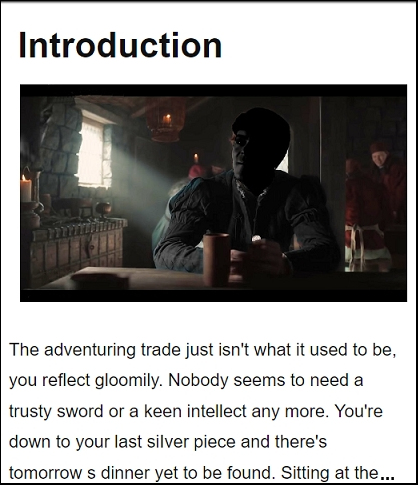
As an Amazon Associate, I earn from qualifying purchases.
Want a short story instead?
I've written a number of short time travel stories. Each is 99p/99¢ and great for taking a break from writing.
Check them out at http://iwadasn.info
